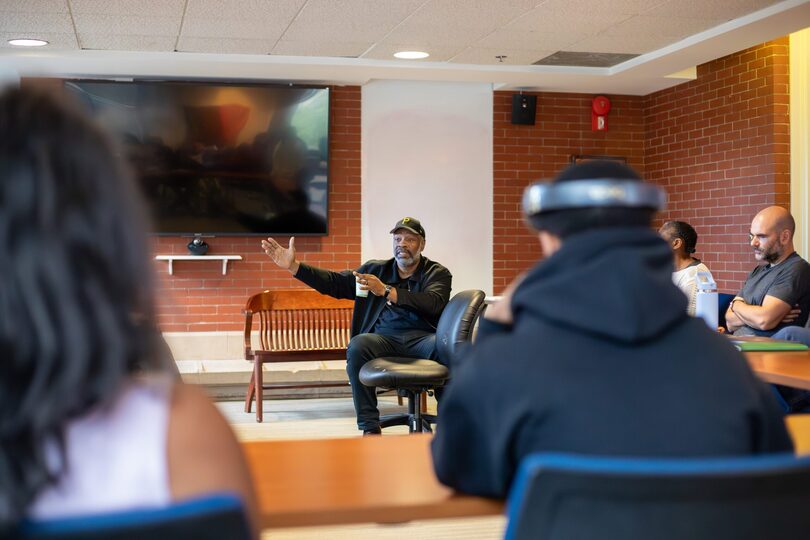Low African American studies enrollment doesn’t justify admission pause, faculty say

Students, faculty and alumni discussed the future of the African American studies major, which is currently paused, at a meeting Wednesday. The event allowed students to express their thoughts on the pause and other SU administrative changes. Leonardo Eriman | Photo Editor
Get the latest Syracuse news delivered right to your inbox.
Subscribe to our newsletter here.
Students, faculty and alumni discussed the future of the African American studies program during an informational session Wednesday night, after Syracuse University paused admissions to the program last month.
Around 30 people attended the session, discussing concerns about the future of the program and assessing its next steps. AAS is one of 20 programs paused as part of the university’s ongoing portfolio review process.
The event was organized by AAS faculty to facilitate communication and allow students to express their thoughts regarding the pause, said James Haywood Rolling, the interim chair of the Department of African American Studies. He added that the pause affected AAS community members both individually and as a collective.
“Faculty want to hear what your feelings are about this, what your questions are, and want to give you an opportunity to make your voice heard on this matter,” Rolling said.
On Sept. 15, College of Arts and Sciences Dean Behzad Mortazavi informed department heads about the admission pauses, which included AAS. Several professors said the pauses were made without any faculty input.
“Every dean was given similar information, apparently during the summer, and every dean is overseeing this in a different way,” Rolling said. “When we walked into that room, it was the first time that most of us had heard that certain programs had been paused as of August.”
In a Tuesday campus-wide email, SU Provost and Vice Chancellor Lois Agnew said the changes are part of an effort to ensure SU’s academic portfolio remains vibrant, relevant and sustainable. She added that each of the paused programs had low enrollment numbers.
Attendees at the info session offered explanations for low engagement with the AAS program.
Terese Millet Joseph, a Ph.D. candidate studying human development and family science, said SU staff questioned the career benefits of her interest in AAS.
“I was outright discouraged from taking any electives in the AAS department. My advisor straight up said it to me, like they didn’t try to sanitize it or anything. They straight up said to me, ‘Why are you taking courses in that department?’” Joseph said.
Danielle Taana Smith, AAS professor and former Renée Crown University Honors Program director, said one way to increase enrollment is to address advisors discouraging students from taking AAS courses.
“We consistently hear from students that advisers tell them not to enroll in African American studies and we are always having conversations with advisers across the university to change that advising approach,” Smith said.
She said there is a lot of misrepresentation surrounding AAS that harms the program.
Associate Professor Herbert G. Ruffin said the administrators making decisions about program pauses come from “traditional academic disciplines.”
“(AAS) is the first interdisciplinary, transdisciplinary department on this campus,” Ruffin said. “It’s the first place to actually practice so-called diversity, inclusion, equity, and there’s a lot of people who basically don’t like that.”
Other faculty said low enrollment numbers don’t reflect the importance of AAS.
Rolling said that while the decision to pause certain programs was number-driven, it didn’t take into account elements of the program that matter to those within it. The story, legacy and history of AAS were left out of the conversation, he said, even as AAS and Black life are being visibly attacked.
The AAS program traces back to the 1960s, when the African American Society and the Black Student Association protested the university’s failure to support Black students, ultimately leading to the creation of the program in 1979, Ruffin said.
On Jan. 12, AAS faculty were notified via email that they would not have a chair for the spring semester after the department and the university failed to reach an agreement on appointing an interim chair. In 2024, a university spokesperson wrote in a statement that the department had seven different chairs in the past 10 years.
On May 8, Mortazavi officially appointed Rolling as interim chair of AAS, a two year-long role.
Darla Hobbs, a graduate student in the Pan African studies program who minored in African American studies as an undergraduate, said it’s important for AAS to have a strong presence on campus.
“This department was built off of resistance and the overall theme of African American studies, and Africanism is resistance in showing up in these spaces and saying ‘This is our space,’” Hobbs said.
Mahder Serekberhan, a graduate student studying political science, said the informational session is only the beginning of an effort to deal with AAS’s pause. Serekberhan said the program is setting an example of transparency and dialogue that SU administrators should follow.
“The faculty of AAS, unlike the people who sent that email with no discussion of how students can actually get engaged in the process, is offering a transparent space where students and faculty could together address the issues,” Serekberhan said.
Other attendees spoke about increasing visibility of AAS through tabling and networking. SU College Democrats President Jurgen Baeza Bernal and Vice President Derry Oliver both expressed their intention to support AAS.
Smith said AAS is not just an important intellectual space, but an emotional space as well. Serekberhan, who’s from Ethiopia, Africa, said she shared that sentiment.
“Not having a department just means a significant part of the intellectual work on the region that I’m from, or the kind of race I represent in this country, is going to be gone, it’s an erasure,” Serekberhan said. “Without the knowledge that this department pumps, you’re going to silence a whole way of knowing and discipline.”





